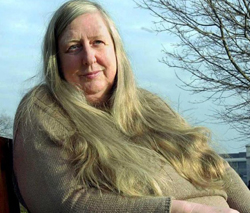The Informant (English)
Underneath the photograph
Of the old woman at her kitchen table
With a window beyond (fuchsias, a henhouse, the sea)
Are entered: her name and age, her late husband's occupation
(A gauger), her birthplace, not here
But in another parish, near the main road.
She is sitting with tea at her elbow
And her own fairy-cakes, baked that morning
For the young man who listens now to the tape
Of her voice changing, telling the story,
And hears himself asking,
Did you ever see it yourself?
Once, I saw it.
Can you describe it? But the sound
Takes off like a jet engine, the machine
Gone haywire, a tearing, an electric
Tempest. Then a stitch of silence.
Something has been lost, the voice resumes
Quietly now,
'The locks
Forced upward, a shirt of air
Pulled over the head. The face bent
And the eyes winced, like craning
To look in the core of a furnace.
The man unravelled
Back to a snag, a dark thread.'
Then what happens?
The person disappears.
For a time he stays close by and speaks
In a child's voice. He is not seen, and
You must leave food out for him, and be careful
Where you throw water after you wash your feet.
And then he is gone?
He's gone, after a while.
You find this more strange than the yearly miracle
Of the loaf turning into a child?
Well, that's natural, she says,
1 often baked the bread for that myself. | Uploaded by | P. T. |
| Source of the quotation | https://books.google.hu/books |
|
A történet elmondása (Hungarian)
Az öregasszony fényképe alatt
Egy konyhaasztalnál mögötte
Ablak látszik (fuksziák, csirkeól és a tenger),
Fölírva neve, kora, az elhunyt férj foglalkozása
(Adótisztviselő volt): születési helye, nem itt,
Egy másik parókián jegyezték. A főúthoz közel.
Teáscsészét tart a kezében
Az asztalon saját sütésű piskótatorta, aznap reggel
Készítette a fiatalembernek, aki most hallgatja, hogy
Változik el a hangja a szalagon, a történethez érve.
És hallja saját hangját, ahogy megkérdezi:
- És maga látta valaha?
Igen, láttam egyszer.
- Le tudná írni? De a hang
Most eltűnik a lökhajtásos gépet
Idéző növekvő harsogásban,
Majd megszakad, csönd.
Valami elveszett, de a hang
Nyugodtan újrakezdi:
„A haja mintha
Égnek állna, egy légáram süvít
A fej fölött. Az arc meggyűrődik
És a szem úgy összeszűkül, mintha
Izzó kohóba nézne.
Az ember teste felbomlik,
Egyetlen sötét fonallá vékonyul.”
- Utána mi lesz?
Az ember eltűnik.
Kicsit még a közelben időz gyerekhangon
beszél. De láthatatlan. Ide kell
Tenni neki ételt és arra is vigyázni kelt
Nehogy a nyakába loccsantsa a lábvizet.
- És akkor eltűnik?
El, egy idő múlva.
És ezt furcsábbnak találja, mint az évente
Ismétlődő csodát, hogy gyerek lesz a cipóból?
Hát az természetes, mondja.
Magam is gyakran sütök kenyeret. | Uploaded by | P. T. |
| Source of the quotation | G. Gy. |
|



